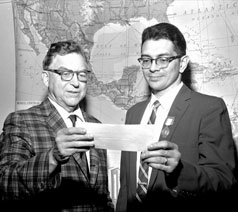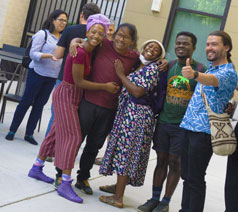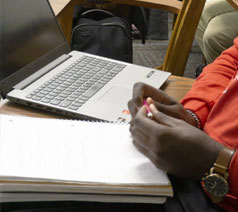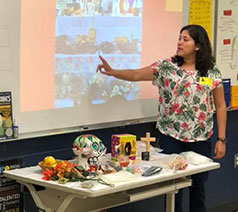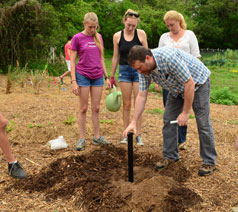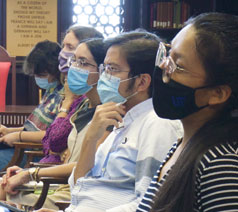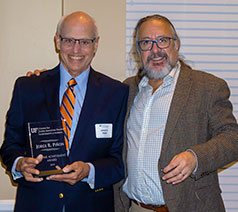Each year, the Center for Latin American Studies welcomes various researchers and visiting scholars from across the globe. Center scholars engage with our faculty and students, expand upon their research by taking advantage of UF's resources, and help bring new scholarly and cultural perspectives to our community. Below are the current research and visiting scholars at the Center.
Nicolás Paris Fall 2025 Kislak Family Foundation Artist in Residence
Nicolás Paris
Kislak Family Foundation Artist in Residence, Fall 2025
Center for Latin American Studies
University of Florida
354 Grinter Hall
Nicolás Paris is an interdisciplinary artist whose conceptually driven work folds together architecture, object, installations, happenings and the act of drawing. With a minimalist’s eye to the small and itinerant, Paris conjures dizzying depths in a single fragile line, evoking palpable communions with the unexpected and the unknown. “We are often told that the shortest distance between two points is a straight line,” he has remarked; “I would like to say that the most effective distance between two human beings is an imaginary line”—an apt description for the generous invitation his work extends to viewers for mutual discovery and rich collective exchange. Perhaps not surprisingly, Paris, a former schoolteacher in a remote region of Colombia, has dedicated much of his life to championing student-directed learning and cultivating practices of self-education. His work has been widely shown in exhibitions throughout the Americas and Europe, including the 54th Biennale di Venezia (2011), the New Museum Triennial (New York, 2012), and the 30th Bienal de São Paulo (2012).
Courses Taught:
- LAS 4935/LAS 6938 Art & Pedagogy in Latin America
Previous Visiting and Research Scholars
Expand the menus below to view some of the past visiting and research scholars at the UF Center for Latin American Studies.
- Previous Bacardi Family Eminent Scholars (Expand)
Dr. Flávia Biroli (Spring 2024)
Flávia Biroli has a Master's and PhD in History at Unicamp (Brazil). She is currently a full professor of Political Science at the University of Brasília (UnB), where she has taught since 2005. She was the president of the Brazilian Political Science Association (2018-20), one of the founders of the Brazilian Network of Women Scientists (2021), and a senior researcher for the National Observatory of Women in Politics of the Brazilian Chamber of Deputies. She was a member of the international Expert Groups that prepared the reports for the 64th and 65th Commission on the Status of Women of the United Nations (2019 and 2020). She has also collaborated with UN Women Brazil in different projects since 2016. She published dozens of articles in Brazilian and international journals, mostly on gender and democracy in Latin America.
She is the author of many books, among them Gênero e Desigualdades: Limites da Democracia no Brasil (São Paulo, Boitempo Editorial, 2018), Gênero, Neoconservadorismo e Democracia (São Paulo, Boitempo Editorial, 2020, with Maria Machado and Juan Vaggione), Feminismo e Política (São Paulo, Boitempo Editorial, 2014, with Luis Felipe Miguel), Autonomia e Desigualdades de Gênero (Niterói, Editora UFF, 2013). She also co-edited many books, including Mulher, Poder e Ciência Política (Campinas, Editora da Unicamp, 2020).
Dr. Solsiree Del Moral (Spring 2023)
Dr. Solsiree Del Moral is Professor of American Studies and Black Studies and chair of the American Studies Department at Amherst College. Her research encompasses Afro-Latin American History, U.S. Afro-Latinx Studies, and Caribbean History, with particular focus on Puerto Rico, the circum-Caribbean, and U.S. colonialism. She is the author of Negotiating Empire: The Cultural Politics of Schools in Puerto Rico, 1898‒1952. Dr. Del Moral has received fellowships from the American Council of Learned Societies, the American Association of Hispanics in Higher Education, and Foreign Language and Area Studies Fellowship Program.
Dr. Mariana Mora (Spring 2022)
Dr. Mora served as the Bacardi Family Eminent Scholar at the Center in the Spring 2022 semester. She taught the course “A Sense of Justice: Afro-descendent and Indigenous anti-colonial struggles in Abya Yala” and served as the keynote speaker of the 2022 Annual Conference, “Ethnographic Evidence in the Americas: On the aesthetics of methods and crafting of claims.” Dr. Mora holds a Ph.D. in Anthropology from the University of Texas at Austin and an M.A. in Latin American Studies from Stanford University. Her research focuses on struggles against violence and the continued processes of colonization as part of State formation in Latin America and her scholarship is situated within critical race theories, gender studies, decoloniality and the political. She is author of the book, Kuxlejal Politics: Indigenous Autonomy, Race and Decolonial Research in Zapatista Communities (2018). Her recent scholarship centers on struggles for justice against racialized forms of violence and territorial dispossession. She is part of the continental Anti-Racist Action Research Network (Red Investigación Acción Anti-Racista, RAIAR), the Collective to Eliminate Racism in Mexico (Copera) and the Decolonial Feminist Network in Mexico.
Dr. Tamar Herzog (Spring 2018)
Alberto Acosta (Spring 2018)
Alberto Acosta was the Spring 2018 Bacardi Family Eminent Scholar, where he taught the course Buen Vivir and Other Post-Development Pathways at the Center for Latin American Studies. He is one of the world’s leading theorists on the concept and implementation of Buen Vivir. Acosta served as President of the assembly charged with drawing up Ecuador’s new constitution that guarantees the Rights of Nature (2007- 2008), was Ecuador’s Minister for energy and mining (2007), and candidate for president (2013). He worked as professor and researcher at FLACSO-Ecuador, and was actively involved in the Yasuní initiative to leave the oil in the soil.
Spring 2015: TCD Lecture Series "Envisioning a Sustainable Tropics"
Dr. Michael Conniff (Spring 2014)
Ulisses Rocha (Spring 2013)
Dr. Joe Foweraker (Spring 2012)
Dr. Jean Stubbs (Spring 2011)
Dr. Mary Allegretti (2005-06)
Dr. Alberto Alonso (2004-05)
Dr. Menno Vellinga (2002-04)
Dr. Germán Carrera Damas (2000-01)
Jelon Vieira (1999-00)
Dr. Candace Slater (1998-99)
Dr. Elizabeth Jelin (1997-98)
Dr. Franklin Pease G.Y. (1996-97)
Dr. Carmen Diana Deere (1995-96)
Dr. Ernesto A. Medina (1994-95)
Dr. Osvaldo Sunkel (1993-94)
Óscar Arias Sánchez (1992-93)
- Previous Kislak Family Foundation Artists/Writers in Residence (Expand)
Eduardo Abaroa (Fall 2024, artist)
Eduardo Abaroa is a Mexican artist and writer working in the fields of sculpture, installation, and live-action. He has exhibited his work in several major museums in Mexico; LA MoCA, PS1, ICA Boston, and CIFO in the United States; Reina Sofía Museum in Spain; Kunstwerke, Germany and other important venues in the United Kingdom, Canada, France, South Korea, etc. In the early nineties, he co-founded the T44 artist-run space. His contributions were also essential in the foundation of Soma, an artist-run school in Mexico City which opened in 2008. He directed the 9th International Symposium of Art Theory in Mexico City (SITAC) in 2011. His most important solo exhibitions include Total Destruction of the Museum of Anthropology and a survey in Amparo Museum. As a writer, Abaroa has published numerous texts about contemporary art, including the book Ensayos sobre el público with Alias and essays about Francis Alÿs, Melanie Smith, Pablo Vargas Lugo, Doctor Lakra, and other artists working in the Mexican context.
Ave Barrera (Fall 2023, writer)
Ave Barrera (Guadalajara, México, 1980) holds a Bachelor in Hispanic Literature from the University of Guadalajara and a Masters in Modern Portuguese Literature from Universidad Nacional Autónoma de México. For several years she was editor in Oaxaca, México. Ave has been awarded fellowships from the Fundación Carolina for a training course on publishing at the Complutense University of Madrid and the Young Creators Grant for Novel (2010 and 2014) from the Mexican National Fund for Culture and the Arts (FONCA). Ave has worked as copywriter for e-media and once as a ghostwriter. She also writes short stories and just published the illustrated children book Una noche en el laberinto (A Night in a Labyrinth, Edebé 2014). She was recipient of the Sergio Galindo Award from the Veracruz University with her first novel Puertas demasiado pequeñas (The Forgery). She currently lives in México City and is writing a new novel: Tratado de la vida marina (A Treatise of Marine Life) with the support of FONCA. Her latest novel was published in 2019 in Mexico and Spain under the title Restauración (Restoration).
Gabriela Alemán (Fall 2022, writer)
Dr. Gabriela Alemán has a PhD from Tulane University, where she later served as Greenleaf Scholar-in-Residence and Visiting Professor of Latin American Studies in 2019-2020. She was awarded a Guggenheim Fellowship in 2006, and in 2007 was named a member of the Bogotá 39, a selection of the most important up-and-coming writers in Latin America in the post-Boom generation. In 2015, she was one of five finalists for the prestigious Premio Hispanoamericano de Cuento Gabriel García Márquez (Colombia) for her story collection La muerte silba un blues.
Dr. Alemán is the author of short story collections Fuga permanente and Álbum de familia and the novels Body Time, Poso Wells, and Humo. Poso Wells, a noir, feminist eco-thriller, is the first of her full-length works to appear in English. In 2022, Álbum de familia will be published in English as Family Album by City Lights in San Francisco. In 2021, she received a National Endowment for the Arts grant to translate her novel Humo into English.
- Other Previous Visiting and Research Scholars
Dr. Miguel Ayarza (researcher)
Dr. Ayarza (Corporación Colombiana de Investigación Agropecuaria [CORPOICA]) visited UF from March 13 - 24, 2017. The main purpose of his visit was to establish collaborative linkages between CORPOICA and researchers at the University of Florida. CORPOICA is interested in strengthening its research capacity in several areas, including assessment of climate change risks and evaluation of technological and socioeconomic adaptation strategies, and to analyze impacts of agricultural intensification on soil and water resources at different spatial and temporal scales. During his stay, he met with faculty to get to know their research activities in these areas, and to identify other potential topics of collaboration.
Dr. Antonio Braga
Dr. Braga (Professor, Department of Sociology and Anthropology, Universidade Estadual Paulista (UNESP)) conducted a study on religion and Brazilian immigrant youth in the United States.
Dr. Ernane Correa Rabelo
Dr. Rabelo (Professor, Universidade Federal de Viçosa, Brazil) conducted research on Brazilian media in the US, especially the influence of new communication technologies on Brazilian immigrants in the US.
Monica Do Nascimento Pessoa
Ph.D. Student in History Postgraduate Program in History - Udesc Associate Researcher with the Nucleus of Afro-Brazilian Studies (NEAB)
Monica is a doctorate student in History at the University of Santa Catarina State (UDESC), in the Post-Graduate Program in History (PPGH), linked to the research line: Political Cultures and Sociability. She is an associate researcher in the African-Brazilian Studies Center (NEAB/UDESC). She is a member of the Observatory of African-Brazilian Culture in Santa Catarina, participating in the Black Culture study group and the critical study group on whiteness. She coordinates the NEAB’s International and Interinstitutional Relations Work Group. She is a member of the Black Researchers Nacional Association (ABPN) and has experience in the areas of African History, addressing themes like Orality, Literature, Cultural Heritage, and Social Memory.
Her Research Project “Griots in contemporary Mali: The trajectory of Toumani Kouyate” aims to reflect about the oral tradition in Western Africa, starting from the way of being, thinking and living of the djelis (words masters). It seeks to set approximations and differentiations to the role of the griot (stories tellers and animators in Western Africa). The practices of the djelis are translated into knowledge and cultures from an “Africa- subject”, with initiatory rites, social relationships, cosmogonies, and teachings, which bear ancestries. The griots have the djelis as their masters, they cheer up and sing with traditional instruments. What are the history and memory meanings for the djelis and griots in Western Africa? We intended, through the memory of Toumani Kouyaté, a djéli from Mali, to understand the role of the oral tradition, interpreting, mainly, the practice of the djeli, as a word wise in the “walking” on the cultural universe of the different Africas in the past and in the present.
Dr. Jennifer Fuenmayor
Jennifer Fuenmayor is an economist and visiting professor from Venezuela, where she has been a professor and researcher at the Faculty of Economic and Social Sciences (FCES) of Zulia University (LUZ) since 1996. Her teaching experience encompasses economic development, public planning, theory of public administration, and analysis and formation of public policies. Her research focuses on public administration, political philosophy, and public policies in Venezuela. Her current active research project is titled “New political cycle, 2018 presidential elections and public policies in Venezuela: high intensity populism?”
Dr. Fuenmayor is a member of the Academy of Economic Sciences of the State of Zulia (ACEEZ) and holds a Master’s degree in economics and political science (LUZ) and a Doctorate degree in political science (LUZ), with postdoctoral research in Management and Public Policies (LUZ).
Dr. Karsten Paerregaard
Dr. Paerregaard was a visiting Professor of Anthropology from the School of Global Studies at the University of Gothenburg, Sweden.
"For the past 25 years, my research has focused on rural-urban migration in Peru and Peruvian transnational migration in the United States, Spain, Italy, Japan, Argentina, and Chile. This work includes studies in migrant networks, remittances, illegality, fiestas, religious practices, political mobilization, family organization, social conflict, and other themes. Analytically, my research is inspired by recent theories of transnationalism and diaspora and, methodologically, I have used a multi-sited research strategy. Theoretically, I want to understand how physical and social mobility are conceived and practiced in a globalized world. My current research is focused on climate change and its environmental effect on Peru's rural and urban population. Of particular interest is how Peru's growing water scarcity due to global warming and the melting glaciers generate new conflicts and how local, regional and national institutions respond to these conflicts. I also explore how rural and urban communities create new strategies and forge new alliances to adapt to the changing environment and examine the role that family households, communal organizations, migrant associations, international tourists, development agencies, small-scale industries, mining companies and state institutions play in the struggle to adjust to the growing water scarcity. My ambition is to create a comparative anthropology of mountain areas and to explore how mountain people use mobility as a strategy to adapt to climate change."
Silvane Silva
Doctoral Candidate - Ph.D. in History from Pontifícia Universidade Católica (PUC/SP)
Silvane's research aims to analyze the political role of women in the struggles to maintain their way of life in the quilombola (former maroon) communities of the State of São Paulo, through the conquest of land titling and access to basic social rights such as health care and formal education. The research seeks to understand the ways in which quilombola women acted in the elaboration of public policies and, at the same time, were influenced by them, from the 1988 Constitution. At that historical moment, Article 68 of the Transitional Constitutional Provisions legitimized the remaining quilombolas communities rights to the recognition and ownership of land. However, the constitutional text alone did not guarantee access to these rights. The rural and urban black movement organized to enforce what was laid down in the law, and other social actors were important in this process: Anthropologists, sectors of the Catholic Church and Pentecostals. With this, new legal norms were created, bringing new fights. In this study, the leadership of quilombola women in these processes is emphasized.
Mauricio Tadeu dos Santos Orosco
Visiting Post-Doc Faculty Universidade Federal de Uberlândia (ufu) – Minas Gerais, Brazil
Mauricio performs and serves as a guitar instructor with the UF Guitar Ensemble. He is also a member of the Alachua Guitar Ensemble, where he provides exclusive arrangements. He is currently writing and preparing new research, “Revising Francisco Araújo’s Compositional Work.” From this research, Dr. Orosco is presently developing a performance repertoire and the preparation of a new album to be released. Dr. Rebecca (Becky) J. Williams Visiting Assistant Professor Masters of Sustainable Development Practice Program Tropical Conservation and Development PDr.
Dr. Mimi Urbanc and Dr. Mateja Smid Hribar
Researchers, Anton Melik Geographical Institute of the Slovenian Academy of Sciences and Arts In collaboration with the UF Department of Anthropology
Dr. Mimi Urbanc and Dr. Mateja Smid Hribar worked with Dr. Catherine Tucker on a project to assess how theoretical approaches to the study of the commons and common-pool resources are interacting with research on ecosystem services. These realms of research have important overlaps and synergies that merit assessment especially given the importance of common-pool resources (forests, savannahs, water sources, the atmosphere, etc.) and ecosystem services for global sustainability and adaptation to social-ecological and climate change processes. With a larger team of researchers in Europe and Latin America, they carried out a broad review of the current state of knowledge, trends, and future directions on research at the intersection of commons and ecosystem services.
Rebecca (Becky) J. Williams
Rebecca (Becky) J. Williams is a Visiting Assistant Professor in the Center for Latin American Studies and she is core faculty in both the Master of Sustainable Development Practice program and the Tropical Conservation and Development program. Her research has two primary focuses including the connections between climate change, violence, and migration; and gender and participatory development with a focus on natural resources and indigenous communities. Williams' most recent research was funded by the United States Agency for International Development (USAID) and took a socio-ecological systems approach to investigating how rural livelihoods in Honduras are being influenced by climate change, resulting in migration and illicit livelihood opportunities (such as gangs and narcotrafficking) becoming alternative opportunity pathways. The results of her research is being used to develop USAID-Honduras' next 5-year development strategy. She is currently working on multiple articles out of her research.
Williams serves on many student committees (Masters and PhD) and participates in the Latin American Studies Curriculum Committee. She enjoys teaching as much as she enjoys research and she offers courses in the Fall and Spring semesters. Dr. Williams holds an M.S. from Florida State University in Instructional Systems Design and a Ph.D. from the University of Florida in Interdisciplinary Ecology with a focus on Tropical Conservation and Development.

